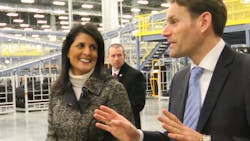South Carolina's Pro-Business Governor Speaks Out
South Carolina has been on a roll, attracting and retaining manufacturing companies, including BMW, Continental Tire and Kent International, Inc., among others.
We spoke with the state's Governor, Nikki Haley, about what role state government has played in its success.
Her answers were encouraging; there's no magic, but rather a simple, relentless focus on customer service. This includes several basic, yet inventive strategies focused on strengthening the state's structural advantages. Emphasis is on workforce/education and training, facility development, ports and transportation, and a network of skilled suppliers. The mix of strategies was developed based on the issues all major corporations are concerned with when building or relocating a business.
What is South Carolina doing to help meet manufacturers’ workforce requirements?
The reason South Carolina has become so popular with domestic as well as international business is that we really partner well. We train our workforce for them. The partnering means that we sit down with the business executives and review what kind of workers they need, and we train their future employees at our own expense.
We have a hiring rate of over 95%. We’re doing it for Boeing, BMW, and all our tire companies, and I really believe that this is what has made us so successful.
We have one of the best training models in the country. One approach is to deliver training through technical schools; the Ready South Carolina program works directly with technical schools and corporations.
Another is that South Carolina has sixteen technical colleges all ready to go.
Finally, what makes our workforce strategy so beautiful is that we are not just offering training and skills, now we’re covering culture. South Carolina has four tire companies. Bridgestone, for example, has a Japanese culture; there’s Continental as well, which is German; and Giti Tire just came in from China. The culture for each is quite different, and our employees need to be prepared to work in each different culture.
Going forward do you see other government/industry collaborations that will help grow more suppliers—first, second, third tier—in this very competitive high-volume manufacturing space?
The main thing we do is listen to our CEOs, not just about getting them to put business in South Carolina. For Continental Tire, we put a person on the ground to help with anything that came up, because we know that time is money.
Another way we help is through our apprenticeship program. Big companies, especially European ones, like to see this type of program.
And we have three research universities that do industry research, like Clemson working on automotive projects. South Carolina encourages institutions to partner with business. The government stays out of the way—it’s all about the CEOs.
The way we see it, if companies are going to take the time to invest, we want to let them know we’ve got their backs. My job is to work for them, whether it’s to meet customers, keep unions out, or help with site selection and preparation; I’m there there at every step.
The story that Kent International’s CEO Arnold Kamler tells about his plant’s natural gas requirement is true. Although we have filled up to 60,000 jobs in 45 out of 46 counties, sometimes the infrastructure is lacking, and for that we have a grant program to help with water, sewer and highway issues. Bringing in Kent was a win-win for the company and the community.
At this point in South Carolina’s growth in industrialization, as governor how do you compare the state to other industry centers such as Tennessee, Ohio, etc. What makes South Carolina different from other possible re-shoring sites?
We are unique. Anybody can sell. Any state can say they have the best business climate, but hands down we are the best. We don’t worry about the competition. We always focus on the customer service from the state because we believe that if a company is going to risk coming, we’ve got their back.
Sometimes you’ll go through hard times. The NLRB (National Labor Relations Board) and Washington union bosses were going after Boeing, 1000 jobs, but we got loud, the whole state got loud. And now we have up to 8,500 non-union jobs, and that says that we are in the customer service business, a true investment partner. No one else can touch the passion of Team South Carolina, the creativity and drive.
Our goal to is make every day better than the day before. We just announced Toray Industries, the largest carbon fiber producer. Their first investment is here; Boeing was in Washington state for years, and now they are here.
Everything we build we make with pride, lots of pride and a strong work ethic.
Mr. Kamler and I have talked about the upcoming challenges for Kent going high-volume in the U.S. with American suppliers. Is the South Carolina government involved in helping businesses like Mr.Kamler's (Kent Bikes) to look at automation and other technology challenges that build competitive advantage?
In high-volume, lower margin businesses, government regulations, taxes, etc., can put an additional burden on a new or re-shoring industries.
What I want to tell them is this is a risky time. They’ve taken enough risk, and if they come, we’ll hand-hold to build the building, we’ll help provide trained workers until first expansion, and we’ll take the risk out of coming. We’ll give them a team.
Their team is me and my cabinet, we work together. When industry is in trouble they get a support system, and that goes a long way. Anytime there is an issue, they make that one phone call—some, like Mr. Kamler, will call me directly.
Continental, a German company, gave us a call, and they are now three months ahead of schedule, because we aren’t focused on what won’t work. We want them to win.
About the Author
Patricia Moody
Publisher
Patricia E. Moody is a writer and manufacturing and supply management consultant with over 30 years of management consulting, hundreds of articles and interviews, speeches, and 12 books to her credit. She is the publisher of Blue Heron Journal, an online resource for thought-leaders and decision makers.
Named by FORTUNE magazine one of the "Ten Pioneering Women in Manufacturing," she was featured on CNN's "21ST CENTURY WITH BERNARD SHAW." Her consulting client list includes Motorola, Respironics, British Petroleum, Waste Management, and Cisco. She consulted to Johnson & Johnson's McNeil Consumer Labs during the Tylenol poisoning crisis and is credited with saving the company. She has an MBA and an Honorary Doctorate.
A pragmatic visionary and self-confessed technology freak, she has little patience for laggards who have dwelled too long on one-note methodologies. She believes that a combination of technology, clear process, and progressive leadership, funded by smart spend management can save endangered companies.

